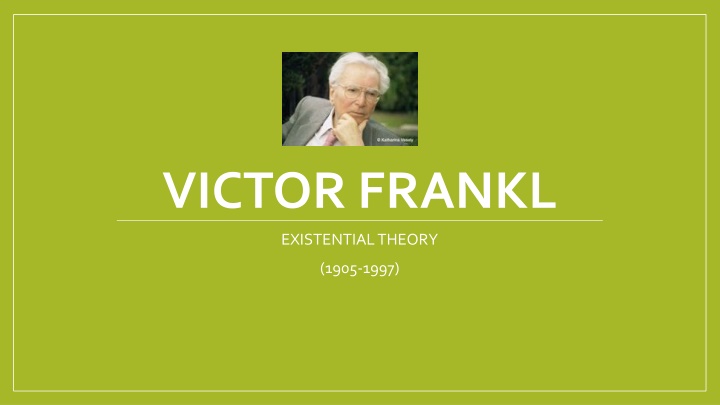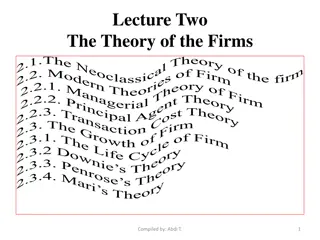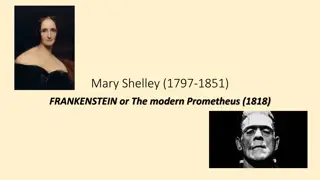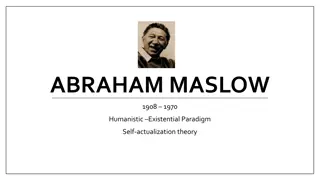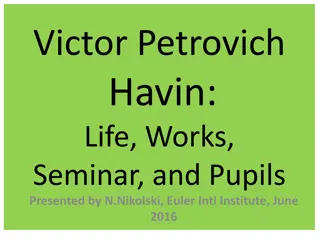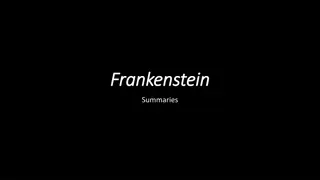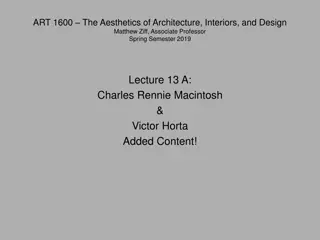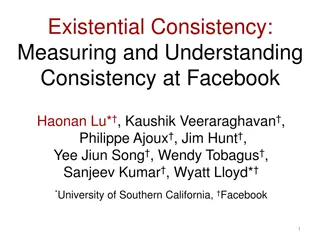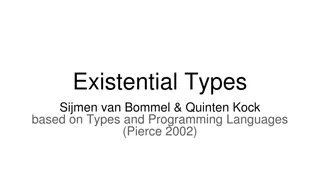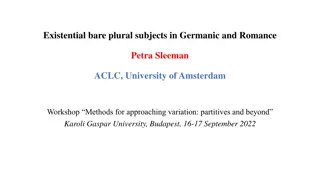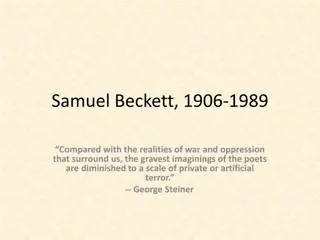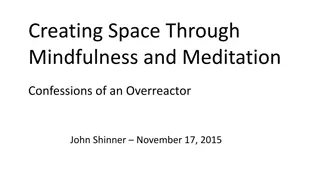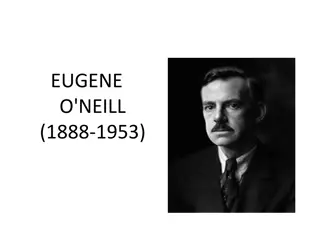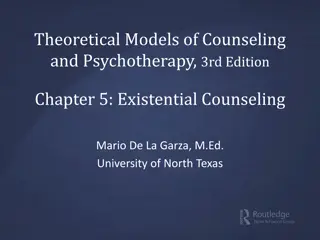Victor Frankl's Existential Theory and Logotherapy
Victor Frankl, a prominent figure in existential psychology, developed the theory of logotherapy, emphasizing the pursuit of meaning as a primary motivator for human beings. He believed in the freedom to choose and take responsibility, transcending mere animal existence to live a meaningful life. Frankl's experiences as a Holocaust survivor influenced his profound insights on the indomitable significance of life and the unique opportunity it presents to find purpose, even in suffering.
Download Presentation

Please find below an Image/Link to download the presentation.
The content on the website is provided AS IS for your information and personal use only. It may not be sold, licensed, or shared on other websites without obtaining consent from the author.If you encounter any issues during the download, it is possible that the publisher has removed the file from their server.
You are allowed to download the files provided on this website for personal or commercial use, subject to the condition that they are used lawfully. All files are the property of their respective owners.
The content on the website is provided AS IS for your information and personal use only. It may not be sold, licensed, or shared on other websites without obtaining consent from the author.
E N D
Presentation Transcript
VICTOR FRANKL EXISTENTIAL THEORY (1905-1997)
Background Workedas professorof Neurologyan psychiatryinVienna Contemplated the meaning and purposeof human existence Opposedideasthat humans are mere mechanismsor animals Was a studentof Freud andAdler He believed that as human being we are primarilymotivated by a willto meaning Own schoolof thought calledlogotherapy, known as the thirdVienneseschoolof psychotherapy Jewish prisoner in several Nazi camps(having something to live for was what enable prisoners to holdon to the willto live) Transcendental vision of being encompasses a great deal more than Maslow s theory of self- actualisation Unusually positiveperspective,believed inindestructiblesignificanceof life Death is the boundary which makes life a unique, unrepeatable opportunity, life is given to us so that we can findmeaning, even insuffering
View of the person underlying the theory We have been given freedom to be able toexercise responsibility, Freedom to be responsible Level of being beyond animal existence To live life beyond mere animal existence, Trans human Dimension To live on a dimension of meaning in releasing timeless values as these emanate from a divine Trans human dimension, Highly personalized way of being (personally accountable) To live highly personalized lives as we (uniquely) embrace the opportunities and fulfil the tasks that life presents toeach one ofus
Freedom to be responsible Person is not merely a highly developed animal shaped by the forces of heredity and the environment but the human person is primarily a spiritual being a being that has freedom andresponsibility We are also notcompelled tobehave in anyparticularway,we can sayYES or NO Because of this freedom to make choices we cannot ascribe our behaviour to conditioning or drives, but must take responsibility for making those choices and taking responsibility =no genic dimension = makes us human
Level of being beyond animal existence True fulfilment is hardly possible without a sense of purpose (spiritual direction) in life the struggle to find and experience this MEANING in life = the opportunity presented to and discerned by us through our conscience as something we are to realise or to grasp in eachandevery unique situationofour ownpersonallives It is true that on a physical and crude psychosocial level we have much in common with the animal,but we alsohavepropertiesNOTsharedby animals Being a personis distinguished by the radical transcendence of the biopsychical, and social faculties andacombinationthereof Self-transcendence = the freedom to rise above conditions and being able to think and do somethingaboutthem When we achieve psychological and spiritual maturity the will to meaning will be stronger thatanyothermotivation Wewanttoknow,we willmake sacrifices,anddevote ourselves toacause
Trans-human Dimension Meaning is something that exist in an objective sense and is phenomenologically proven by the fact that in life we feel addresses by our conscience, called upon to act responsibly Conscience is the vehicle through which we detect meaning, the one right thing to doin anyparticular situationormoment in life We are not merely subjected to the social restrictions our superego has internalized, this conscience functionson ahigher level life is unconditionally meaningful = faith the substance of thins hoped for, the evidence ofthings not seen
Highly personalized way of being (personally accountable) Something can only be meaningful if it is personally experienced assuch religion is genuine only if we commit ourselves to it by freely choosing to be religious, never can anyone be forced toit Life holds meaning under all circumstances and that meaning can be experienced by anyoneatanytime We are only fully what we have been created to be when we live and move and have our being our being on the dimension of meaning
The structure of the personality : (1) Three dimensions of the personality: Physical: Psychological Spiritual This dimension is unique to human beings. Due to our spiritual capacities we as human beings, are free. Human personality has a spiritual core. He describes the spiritual dimension as the personal ground of being Described as nothing but a complex biochemical mechanism powered by a combustion system which energizer computer with prodigious storage facilities for retaining encoded information. The person has needs and drive, in many ways similar to animals
The structure of the personality : (2) Dynamicsof Personality: Frankl speaks about no dynamics (spiritual dynamics) of being human, rather than psychodynamics Our wills are not instrumental in satisfying instincts (pleasure) or ensuring self- preservation (power). Dynamicsof the personality are based on3 things: 1. Freedom of will 2. Will tomeaning 3. Meaning of life
Freedom of the will We all constantly faces choices and the decisions we make determine the future course of events Not absolutely free contend with our own limitations and constraints placed upon us by our particular environments. Our freedom is contained in what we will achieve, despite our limitations Will to meaning The will to meaning is deeper and more powerful than any other human motivation: Our will are free Not merely propelled and aimlessly driven We can think and make decisions Want to know why Four observation to prove our basic motivation is our will to meaning: The will to meaning is manifested in circumstances of destitution as well as in circumstances of plenty The satisfaction of physical and psychological needs is not the ultimate aim of human striving, but rather he means to being free to strive towards spiritual goals The more a person pursues happiness, the more it eludes him or her because happiness is the effect of the attainment of meaning and cannot be pursued as an end When the will to pleasure and power are uppermost in our behaviours, this would be a sign that our will to meaning is frustrated Meaning of life Can be found in 3 principal ways : Creative values experience through what we contribute to life Experiential values blessings we receive from life Attitudinal values values we experience through the right attitudes we have towards life
Development of personality The core of the personality is alreadypresent atbirth anddevelops throughout life At birth life is anopenpossibility with the potential in usto achieve anything Only atthe end of ourlives are we fully actualized We are the force behind what we will become, self-determining Biologically we are the work of our parents, but spiritually we are our own life s work During the course of development uniquely human characteristics such as self- consciousness, conscience andresponsible behaviour emerge The person should be seen as a time-Gestalt . We are only fully developed in maturity andonly then fully manifest uniquely human characteristics
Optimal Development When we function on the spiritual level; fully exercise freedom of will, fulfil the basic human motive of searching for, finding andrealising meaning in ourlives Only a small minority of people because it takes courage and boldness to be optimally human
1. Self-determining action Take a stand concerning themselves and their circumstances, freely decide what they should do and how they should act Does not attribute fate to internal or external factors or pressures
2. Realistic perception Separate and distance themselves from what is happening to them, thus view matters objectively and critically Therefore e perceive self and circumstances realistically
3. Humour Distance self from weaknesses and problems and can laugh at self
4. Self-transcendence Are outward-looking rather than turned in on self, move beyond the self Want to be involved in whatever gives their life meaning Want to be faced with a tasks, to be challenged and to feel they have a calling Dedicated to values and ideals Own satisfaction and happiness are not the primary goals in life, but incidental side-effects of meaning fulfillmenance self from weaknesses and problems and can laughatself
5. Future directedness Are actively future directed as they are continually reaching out beyond a mere day-to-dayexistence Havegoals,avision for their future Pastis alsoarich treasure house offulfilled possibilities Death is not a threat, but a meaningful conclusion of the life that offered them precious opportunities andthat they used tothe bestof their abilities
6. Work as vacation Regard their work as a vocation through which they respond to the demands of responsibility Work is an opportunity to make a worthwhile contribution to life
7. Appreciation of goodness, beauty and truth Receptive to the experience of good, beautiful and genuine thing life offers Deeply enjoy and appreciate things like art, music, literature, nature everyday, every moment, each situation, is ready with new meaning Open to these new experiences offered daily
8. Respect and appreciation for the uniqueness of others Attitude towards others is one of respect and appreciation Never makes other people the object of won satisfaction or use them to achieve own selfish ends Want to have meaningful encounters with others and this can only happen when others are respected asindividuals in their own right Are free from prejudice, anddiscrimination in their attitudetowardsothers
9. Meaning in suffering Have accepted that tragic fatalities of life and in such a way that it does not diminish their joy in life and that their belief in the meaning of life is actually deepened, itis unshakeable These people have reached the highest peak ofdevelopment
Views on Psychopathology Human dignity of the psychiatric patient No genic neurosis Lacing courage to respond to the challenge of life to exercise their freedom responsibly Even psychotic and mentally deficient peoplearehumanandhavedignity Responsibility is evaded, avoided, shirked or minimized; conscience becomes dulled The so-called life not worth living does not exist, the nucleus of man remains indestructible, if this were not the case, it wouldbe futile tobe apsychiatrist They seek pleasure and power and position, they have an adroit business due to the denial of their spiritual side Life becomes empty and meaningless, and existential vacuumdevelops This neurosis has some characteristics: (man s fear of responsibility andhisescape fromfreedom) Andunplannedday-to-dayexistence Afatalisticattitudetowardslife Conformism Totalitarianism
Psychotherapy Logo therapy the thirdViennese school of psychotherapy Notonly recognizes man s spirit but actually starts from it Logo therapy therapy throughmeaning Tohelp people discover or re-discover meaning in their lives To challenge people to become aware of things which require them to be responsible and which demand their love, care and involvement Their attention is drawn to this meaning by way of using Socratic dialogue which evokes critical and creative thoughtto come up withtheir own answers Nota problem-centered but meaning-centered therapy Focus is not on their problems but their freedom to deal with them, to take a stand by the way of the attitudes they choose toadopt Often simple toview and existing situation differently Can also use shocking confrontation, paradoxical intention (outsmart anxiety with a humorous trick), or de- reflection (think of something else) Also utilize self-detachment and self-transcendence with these techniques And existential re-orientation
Interpretation and handling of aggression Unmistakable and pronounced evil inclination in human nature Aggression is an inherent part of the human make-up We are shaped by the kind of society in which we live = violence breeds violence BUT we have the freedom and ability not only to control aggressive impulses but also to counteract and overcome them We can resist negative pressures and conditioning and even change the environment for the better The freedom to bear oneself this way or that way WHAT we do CHOOSE to do in the face of aggressive impulses and how do we DEAL with it in the environment
PAST PAPERS & Tutorials: 2016-2011
Which of the following statement/s best describes self-transcendence? Psychologically healthy people are open to new experiences and seek to find meaning in suffering. a. Mature people do not focus on their problems. Rather, they pour their energy into searching for solutions totheir problems. b. Self-transcendence is possible only in optimally developed people who have managedtosatisfy their own individual andsocial needs. c. Self-transcendence can only be attained by forgetting about our own needs and problems andfocusing onthe world aroundus. d. The correct answer is: 1. (a) 2. (d) 3. (b) & (c) 4. All of the above Answer: 2
Alternative 2 is correct. Frankl considered self-transcendence to be a characteristic of the optimally developed person. It refers to the ability to move beyond our own problems and issues and to focus instead on reaching out to someone or something higher than ourselves. In other words, self-transcendence is about moving beyond our own happiness and satisfaction such that we are able to cultivate meaningful relationships with people and the world. Statement (a) is true: Psychologically healthy people demonstrate openness to new experiences and, rather than wallow in their own suffering, seek to find meaning in their trials and tribulations. However, this does not refer to self-transcendence. Statement (b) is also correct: It is true that mature people focus rather on finding solutions to their problems than on the problem itself. However, in searching for solutions to our own problems we are still focusing on ourselves rather than directing our attention and energy to the world around us. Statement (c) is incorrect because self-transcendence refers to moving beyond satisfying our own needs. Statement (d) is correct because, only by shifting our focus away from our own problems can we move beyond the self in order to achieve intimate and productive relationships with the world and with others .
Siphos life is one of the many tragic cases of homeless people in South Africa. He lives under a cardboard box in an alley behind the station in central Johannesburg. He has no money and often goes to sleep without having anything to eat. According to Frankl Sipho is unlikely to find meaning in life because he has no freedom or choice in his current circumstances. a. Sipho can find meaning in his suffering and rise above his tragic circumstances through the choices he makes in life. b. Sipho may be able to attain happiness despite his circumstances if he is able to find his life purpose. c. Sipho s will to pleasure will dominate his behaviour as his lower-order needs for food and shelter have not been satisfied. d. The correct answer is: 1. (a) 2. (b) 3. (c) 4. (d) Answer: 2
Alternative (2) is correct. Frankls theory holds that, despite his tragic circumstances, Sipho can choose to find meaning in his suffering. People cannot always control the constraints imposed upon us by the environment, but we can choose how we react to them. By actively choosing to transcend the pain of our circumstances we can turn our pain into triumph by living a life of worth and dignity, even in the face of suffering. Statement (a) is incorrect: Frankl maintained that we always have a choice as to how to react, even in the face of tremendous suffering (such as he endured in the concentration camps). Statement (c) is incorrect because happiness is not a goal that can be attained : Happiness cannot be pursued as an end in itself, because happiness results from the meaning we find in life. Statement (d) is also incorrect: The will to pleasure (or power) dominates when the will to meaning is frustrated (and not because of unfulfilled needs for food or shelter).
Many people believe that our childhood experiences shape our personalities and impact our adult lives and our views of the future. Which of the following statements correctly reflects Frankl s views on this issue? Freedom of the will means that we can choose to disregard the trials and tribulations of childhood and thus triumph over adversity as adults. a. We are not absolutely free: Our childhood suffering teaches us about the situations we have control over and those we do not. As adults we can therefore exercise our freedom of will to deal with situations we can control whilst avoiding those we cannot. b. As adults, our freedom lies in how we choose to deal with the environmental constraints that were placed on us as children. c. As adults, we can avoid the suffering we experienced as children by choosing to be responsible. d. The correct answer is: 1. (a) 2. (a), (c) & (d) 3. (b) & (d) 4. (c) Answer: 4
Alternative 4 is correct. Statement (a) is incorrect as we cannot simply disregard the suffering we experienced as children: Many childhood experiences stay with us for a long time. However, as adults, we still have the freedom to choose how we will react to adversity, despite childhood suffering. Statement (b) is incorrect because we are often faced with situations we cannot control. The point is not to avoid these difficult situations but to choose to act responsibly in spite of them. Statement (d) is incorrect as we cannot avoid suffering: Suffering is an inevitable part of the human condition. Through our freedom of will we can merely choose to deal with the adversity we encounter in life in a responsible, productive and moral way.
Thabo is a successful businessman who lives the high life. He gambles at a local casino several times per week. He loves partying and spends vast amounts of money on cars and exotic holidays. He calls himself a womaniser and often brags to his friends about his many sexual escapades. According to Frankl Thabo can be considered to be an optimally developed person: His success has brought him happiness and an appreciation of the good, beauty and truth in life. a. Thabo is exercising his freedom of the will by making choices that bring him happiness and success. b. Thabo s will to meaning is frustrated because, despite his success, he is not functioning at the level of self-actualisation. c. Thabo is motivated primarily by the will to pleasure and is therefore living in an existential vacuum. d. The correct answer is: 1. (a) 2. (a) & (b) 3. (c) & (d) 4. (d) Answer: 4
Alternative 4 is correct. Statement (a) is incorrect because being successful does not necessarily bring a sense of happiness or mean that a person is optimally developed. Many successful people are driven simply by money or pleasure (which seems to be the case with Thabo). Despite their success, however, they remain bitterly unhappy. (One just has to think about the many successful actors and singers who, despite having every material thing they could ever wish for, have overdosed on drugs or committed suicide. Money and success does not bring you happiness and could, in contrast, serve to detract from the good, beauty and truth in life.) Statement (b) is incorrect because, even though it may seem that he is making the right choices and exercising his freedom of will, being motivated by money and success suggests that Thabo is looking for happiness in all the wrong places. His pursuit of pleasure further suggests that, despite his success, his will to meaning is frustrated. However, this is not because, as Statement (c) states, he is functioning at the level of self-actualisation: Self-actualisation, according to Frankl, is a by-product of a meaningful life and not a goal in itself. Statement (d) is correct because, being driven mainly by a will to pleasure, as in Thabo s case, indicates that Thabo s life holds little meaning despite his success. This is why he needs to spend money on cars, women and gambling in order to feel like a success.
Sandy has a problem with stuttering. Whenever she has to stand up and talk in front of a room full of people, she is unable to control her stutter. Sandy enlisted the help of a speech therapist to help her manage her stuttering. The therapist suggested an unusual but effective technique for Sandy to use the next time she has to talk in front of an audience: Rather than concentrating on and worrying about her stuttering she must picture the audience as if they were dressed in a funny way. Directing her attention away from her stuttering and concentrating rather on the funny mental image of the audience that is dressed in a funny way is an example of Self-determining action 1. Dereflection 2. Self-awareness 3. Logotherapy 4. Answer:2
Alternative 2 is correct. Directing attention away from a problem by focussing on someone or something other than ourselves is a therapeutic technique used in logotherapy called dereflection. Self-determining action is a characteristic of optimally developed people and refers to the notion that we cannot attribute our fate to internal or external factors. Self-awareness refers to the fact that human beings, unlike animals, have the capacity to think intelligently about ourselves, our motives and our behaviours. Logotherapy refers to a therapeutic method developed by Frankl and is aimed at challenging people to discover meaning in their lives and to become aware of things which require them to live life responsibly through an investment in love, care and an involvement in the world around us.
There may have been times in your life that you felt extremely anxious. Virtually all you could think about was how to protect or somehow defend yourself against what you were experiencing. Which of the following statements would fit what Frankl had to say about such situations in the lives of human beings? Freedom of choice only operates when we are in situations of relative safety and security. a. The most effective way of dealing with extreme stress is to back away or withdraw from confrontation with the problem or situation causing the stress and to find relieving ways or techniques of coping with it. b. The greatest sense of triumph and joyous relief comes from the realisation that we are not the hapless victim of circumstances but that, even in the worst situations, we still have the freedom to determine what kind of person we are going to be in the face of the stressful situation. c. Like the animal, we as human beings have strong survival instincts which can prompt us, under extreme situations, to act in ways that under other circumstances we will not think of doing (e.g. in securing our own safety at the cost of others; in being deceitful, even in stealing or, at the extreme, plotting the downfall or even killing those whom we feel are a threat to us). d. The correct answer is: 1. (a) & (b) 2. (a) & (d) 3. (c) 4. (c) & (d) Answer:4
Frankl maintained that even under the most adverse circumstances, we still retain the freedom to choose whether we will deal in a moral or immoral way with that which threatens us. Statement (a) is therefore incorrect. The realisation that we are not the hapless victim of circumstances, enables us to face up to and deal with difficult or stressful events in our lives. We will not try to escape the situation but courageously confront it. Statement (b) is therefore incorrect and Statement (c) correct. However, we share survival instincts with the animals which at times can be so predominant that we can act in cruel, thoughtless and destructive ways. We are not compelled to act that way, but can be tempted to do so. Statement (d) is therefore correct. The correct answer is thus Alternative 4 which includes Statements (c) and (d).
We live in a world that is highly competitive. It is also a world that sharply distinguishes between the haves and the have not or the achievers and the non-achievers. What ideas have you developed and what beliefs do you hold with regard to your own position in life? Indicate which of these ideas and beliefs correspond to the views of Frankl. Success is a measure of your worth as a person. Failure is the experience of the weak and the inadequate. a. Every person should strive to actualise whatever potential and talent he or she has. The highest goal in life is self-actualisation. b. Every person has a destined role to play. The secret is to discover what life requires of us and to do it, no matter what it brings in its wake. c. The law of nature is the law of human society as well: it is the fittest that survive or make it in this world. d. The correct answer is: 1. (a) & (d) 2. (a), (b) & (c) 3. (b) & (c) 4. (c) Answer:4
Frankl maintained that all of life has meaning, even failure. Failure, like suffering, can cause us to realise truths and learn things about ourselves and about life which we may never have done otherwise. Success therefore cannot be seen as the yardstick of a worthwhile or meaningful life. Statement (a) is thus incorrect. Frankl clearly maintained that we best actualise ourselves by not placing the focus on ourselves and on our success or reputations in life, but on a worthy cause that we commit ourselves to. In serving others, we serve ourselves! Statement (b) is therefore also incorrect. Frankl maintained that we have only our own lives to live with its own problems, challenges and opportunities. Often the road we feel destined to travel requires that we choose to realise one rather than the other thing that we are good at. Not all of our talents get realised, only those that serve to let us fulfil our peculiar tasks or destined duties in life. This view of Frankl further highlights the incorrectness of making self-actualisation our focus in life, and is expressed in Statement (c), the correct option. Frankl s concentration camp experiences further illuminated the fact that, even if this was no guarantee of survival, it was not so much the physically fit or hardy individuals that survived, but those with a strong spirit, even if they were physically weak and not so hardy constitutionally. In human society, therefore, the law of the jungle does not prevail, but the exact opposite. The greatness of human society or of human beings is measured not in how physically fit and hardy they are, but in how much they care for the weak and to what extent they commit themselves in alleviating the suffering of others. Statement (d) is therefore incorrect. Since only Statement (c) reflects the view of Frankl, Alternative 4 is the correct answer.
How strongly does religion feature in your life? What views do you hold as a result of your religious mind-set? Which of the following views, that may or may not reflect your own views, correspond to the views held by Frankl? Religion is a conscious commitment, and only those who have committed themselves in such a conscious way are included in the community of true believers. a. Everyone relates to God or to a Higher Power, whether this relationship is expressed consciously or is unconscious and also whether this relationship is a positive or a negative one (e.g. expresses itself in faith in the existence of God or in a denial of such existence). b. If we are convinced of the truth of our particular religious persuasions, it is our duty to persuade others to believe likewise. c. Unconditional faith in the unconditional meaningfulness of life allows us to say: Yes! To life under all circumstances, even the incomprehensible ones. d. The correct answer is: 1. (a) & (c) 2. (a) & (d) 3. (b) & (d) 4. (a), (c) & (d) Answer:3
Few areas in life are as provocative as those relating to religious views and persuasions. Frankl s views are particularly thought-provoking when applied to religious beliefs and mind-sets. Statement (a), and with it Statement (c), are popular opinions among the religiously devout. The only problem is that there is more than one religion espousing these views, often making for conflict among them! Frankl s dimensional ontology can make for greater religious tolerance. He maintained that just as the human dimension overarches the subhuman or animalistic dimensions, so the Supra-human dimension overarches the human. This means that the Supra-human dimension or God cannot be fully explained in human terms nor be encapsulated within just one belief system at the exclusion of all others. Since faith, to be genuine, must be something personally meaningful and real to the individual person, it makes little sense to condemn others who do not feel exactly the same way we do about ultimate (or religious) issues. Statements (a) and (c) therefore, do not correspond to Frankl s views. Frankl further maintained that at the heart of every human life is a will to meaning, however much this will may have been thwarted or even will-fully suppressed. These views are reflected in Statement (b), which, unlike Statements (a) and (c), expresses Frankl s view. Statement (d) is another refreshing view of Frankl, indicating that our faith often transcends the need to have all the answers to everything in life. We can therefore live life the way we feel it should be lived, even if we do not fully understand everything about it! Since Statements (b) and (d) reflect the views of Frankl, Alternative 3 is the correct answer.
You may have considered the impact of your childhood experiences on the shaping of your personality and how it still impacts on your present life and your views of the future. Considering Frankl s views on the dynamics of the personality, which of the following statements correctly reflect/s what he believed? We are not absolutely free. Our freedom is contained in what we do with the influences we have undergone and the circumstances in which we have been placed. a. Human freedom means that we have the power to disregard the unhappy things we suffered in our formative years and that we can triumph in total victory over it all. b. It is possible that childhood influences could have been so bad, hardships so severe or an illness so devastating, that we experience ourselves as helpless to do anything about it. c. The true view of what it means to be human cannot be found in averages since those who reach full human stature in manifesting what human beings are capable of, are in the minority. d. The correct answer is: 1. (a) & (c) 2. (a), (c) & (d) 3. (b) 4. (b) & (d) Answer:2
It is important to realise that Frankl contended that his illumination of the higher reaches of personality development does not cancel out what transpires on the lower levels of being. He regarded logotherapy as a complement to other types of therapies which deal with physical or organic diseases like schizophrenia, or with the psychodynamic psychotherapies dealing with emotional and social conflict. Frankl maintained that we are not absolutely free and that sometimes, like in schizophrenia or some extreme stress situation, we do indeed experience our wills as not free. It does ask exceptional courage and the grace of circumstances to reach the highest levels of being. Those who reach it, have the responsibility of feeling compassion for, and helping those, who have not or even cannot reach those levels of supreme being. Statement (b) is therefore incorrect while Statements (a), (c) and (d), correct. The correct answer is therefore Alternative 2.
What do you long for in your life? What are your prospects for the future? In considering the answer to these questions, which of the following ideas correspond to what Viktor Frankl had to say on these subjects? To gain optimum security and a sense of belonging to a group, religion, nation or country which one has designated as one s own, is the foothold we all need to feel optimally happy and satisfied. a. To do your own thing, at your own discretion, time and to your own personal liking, even if it upsets the apple cart, or goes against the grain of what your family, religion or group want of you, is the only way to feel good about yourself. b. The greatest challenge is to live with uncertainty and to realise that you are not the complete master of your own destiny. c. The secret of human fulfilment is to discover where you are needed and to give of yourself even if this, at times, depletes, depresses or exhausts you. d. The correct answer is: 1. (a) 2. (b) 3. (b) & (d) 4. (c) & (d) Answer:4
Frankl contended that the more open and receptive to change we are, the more able to live with uncertainty, the greater our sense of awe at the beauty, wonder and order or meaning of human existence in a world that needs us. It is in a sense of responsibility towards someone or something outside of ourselves and a realisation of being dependent on something greater than ourselves, that a sense of the true worthwhileness of life can be found. In view of this particular life s orientation espoused by Frankl, Statements (a) and (b) are incorrect and Statements (c) and (d) (Alternative 4) correct.
